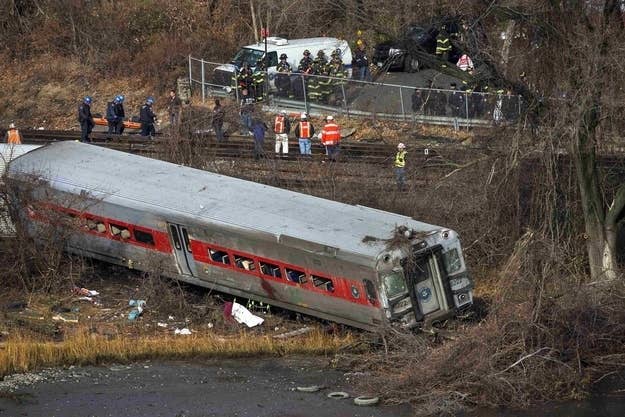
When disaster strikes, some mayors rush for the TV cameras. After New York's deadliest train crash in more than two decades, Mayor Michael Bloomberg may have been ambling toward his caddy.
The Wall Street Journal, in a report that City Hall isn't denying, says Bloomberg was in his familiar weekend hideaway in Bermuda when the Metro-North train derailed early Sunday morning. Instead of racing back to the Bronx on his private jet, Hizzoner reportedly amped up his weekend relaxation with a round of golf, lingering at the Mid Ocean Club until 1 p.m. (Noon, New York time). That's more than four hours after the accident, which killed four people, injured dozens of others, and snarled thousands of morning commutes.
The mayor says he was briefed just after the derailment, keeping in close touch with top deputies responsible for the rescue. His aides also note that technically Metro-North falls under the governor's portfolio, although the NYPD and FDNY were the ones pulling bodies from the wreckage. But there's no way to sugarcoat it: At the same time stunned survivors were immobilized next to their deceased fellow passengers, Bloomberg may have been mulling whether to use a 3 or a 4 iron.
"What can I do? I'm not a professional firefighter or a police officer," he told the press after finally emerging Sunday evening to visit injured at a Bronx Hospital. "There's nothing I can do. What I can do is make sure that the right people from New York City — our police commissioner, our fire commissioner and our emergency management commissioner — are there and that they have all the resources that they want."
He may be right.
It's easy for critics to use episodes like this one to cast New York's billionaire mayor as a checked-out, out-of-touch Richie Rich. During the famous blizzard of 2010, for example, the administration was caught unprepared with Bloomberg stuck in (natch) Bermuda — a PR fail that drew an onslaught of nasty tabloid headlines. But you can just as easily make the case that in choosing to linger at the links rather than rush back to the city in times of crisis, Bloomberg is doing the city a service.
Declining to move heaven and earth — or to simply pop in his jet — to return to the city after the Metro-North crash may well have tamped down the hysteria and fear that often follows these rare events. At the national level, no-drama Obama has frequently been criticized for failing to emote during tragedies. But presidential righteous indignation won't stop an oil spill.
Much the same, a mayor rushing to the scene of a train accident — cameras in tow — won't heal any broken ribs or bring victims back to life. And by keeping his cool and staying out of the way, Bloomberg might have prevented panic from spreading.
New York's incoming mayor Bill de Blasio, a self-styled liberal populist, didn't waste much time in seizing on Bloomberg's absence to draw contrast with himself.
"My instinct in these things is to be present, even if the city is not the lead" de Blasio says. "Obviously, it's a bit of a case-by-case situation, but in this case, I would have been."
But what could a mayor have said that others hadn't said already: how many had been killed, how many injured, and what the next steps should be? Yes, a mayor is more than the chief executive of a vast government apparatus. We look to them for reassurance and expressions of collective emotions — hopefully, our better emotions. Maybe by not showing up, Bloomberg did. He clearly saw the merit in channeling the belief that it's OK — perhaps even healthier — for us all to look away, as well.
It also shows that unlike his predecessor Rudy Giuliani, Bloomberg is willing to cede the spotlight, in this case to Gov. Andrew Cuomo, who has more control over the region's rail network. (Although, who knows, maybe Bloomberg just didn't want to cut short a golf game to stand with the governor, with whom he is not close).
No matter what he was thinking, staying in Bermuda speaks plainly to the mayor's style since he took office shortly after the 2001 terror attacks. Voters elected him not to hold collective hands, but because they trusted that his private sector acumen could save the still-smoldering city from morphing into a ghost town. Ever since, Bloomberg believed in trusting lieutenants, as long as they supplied data.
As for the other part of the job — that of being an emoter — Bloomberg tried, sometimes, but not very hard. (A notable exception was his defense of an Islamic Center to be built several blocks from the World Trade Center site). He seemed to think that rushing to accidents was mostly B.S. — "grandstanding" in the words of his biographer, Joyce Purnick. He rolls his eyes a lot, as if to say "get over it." He's plainly allergic to nostalgia and maudlinness.
Bloomberg sees his job as setting an appropriate ethos, providing resources, delegating responsibility — and then compartmentalizing it all. You can gripe about whether the city is better under his leadership. But when it comes to last weekend, no one was complaining about the city's response to the accident.
It all reminds me of what legendary golf teacher Percy Bloomer once said: "If you wish to hide your character, do not play golf."
